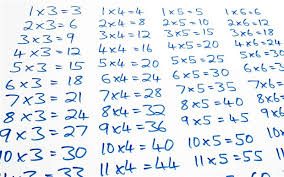
What we know about the new times table test for year 4.
It’s being called a ‘check’ rather than a test, but schools will be held to account against the results. It will be a computer based test which will be marked instantly. It’ll be for times tables up to 12×12. It will be timed – children will have a set time to complete the test; we believe about 5 minutes.
It was piloted with about 3000 pupils in 80 schools during summer 2016, with the roll-out to all schools in 2020, with schools being able to trial the test in 2019.
What we can guess about the new times table test for year 6.
It’s sensible to assume that it will randomly test the times tables – 5×3, followed by 6×7, 12×11, 7×8 etc, rather than in order, which children tend to find harder.
It’s also possible that these tests will include the inverse division facts – 25÷5, 144÷12, 56÷8 etc. and word problems such as ‘If Lily and her 3 friends have 3 pets each, how many pets do they have altogether?’ and ‘Josh’s class has 32 children in it, if they were put into teams of 4, how many teams would they have?’
How can I help my kids to learn their times table facts?
Children can be great at listing out their times table facts in turn:
Asking kids to remember these out of turn is hugely beneficial in supporting them with this new test – do a few each day for fun – but also invaluable in helping them to be much more efficient (quicker) with their maths, generally.
It’s really helpful (and may be asked in the online test) to know their division facts too – add a few of those in each day too.
Online resources can help to hone their skills too:
http://www.topmarks.co.uk/maths-games/hit-the-button This one allows you to set it up either looking for the answer to a multiplication question or alternatively, to find the question to the answer. These are really good skills to have.
This online resource only goes up to 10×10, so do make sure you’re covering off 11 and 12 times tables too.
What we think at Tutor My Kids
Times tables and other number facts are the back bone of maths – the structure that supports the rest of the knowledge. Another way of looking at them is as the foundations of a building. If these are solid, the whole structure (or body) supports itself.
Whilst it is another test, most kids will engage with a times table quiz – especially an online one. Times tables are so key to helping them more quickly and confidently tackle more advanced maths, so focus on this will be hugely helpful. When I go out to assess children before I match them with a private tutor in Cambridgeshire, it’s not unusual to find poor times table skills; when these are present in secondary aged children, this can present to huge problem in tackling more advanced maths quickly and efficiently. Kids need to be able to recall number facts quickly and accurately for help them with those more complex areas.
That said, there are children who will always find retaining their times tables exceptionally hard and these kids will find this new test impossible. For these kids, they need support to find ways to derive these facts. See my How to make maths easy for kids series for more ways to help; follow the links on Facebook, or visit our website.
How do I help my kids at maths
How to make maths easy – Number bonds
How to make maths easy – Doubling
How to make maths easy – Near Doubling
Maths Confidence and Numerateness
Helping students to be confident at maths is something that our private tutors in Cambridge and surrounding areas do all the time. This confidence starts with having having number facts at quick recall; it speeds up the work and enables students to feel that they’re able to work more quickly and allows children to access more complex material. Teaching children numerateness (Yes, I know this is a made up word – but it fits the bill) means that they have an understanding of number which sets them up for life and further learning.
Tutoring maths is a highly specialised thing, because each child will have gaps in their learning that are unique to the child. One-to-one tuition enables these gaps to be filled thoroughly, effectively and efficiently.
Then finally, you’re making it easy for your children to excel at maths, to be confident and numerate.
Get help from a private tutor in Cambridgeshire
If you would like further information on private tuition in Cambridge, Ely and the surrounding areas, there’s more information on the Tutor My Kids website here or you can call Rachel Law for a chat on 01223 858421.





